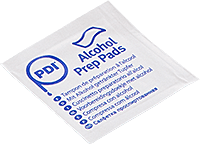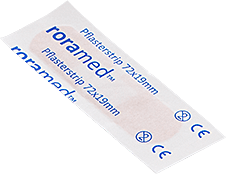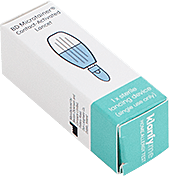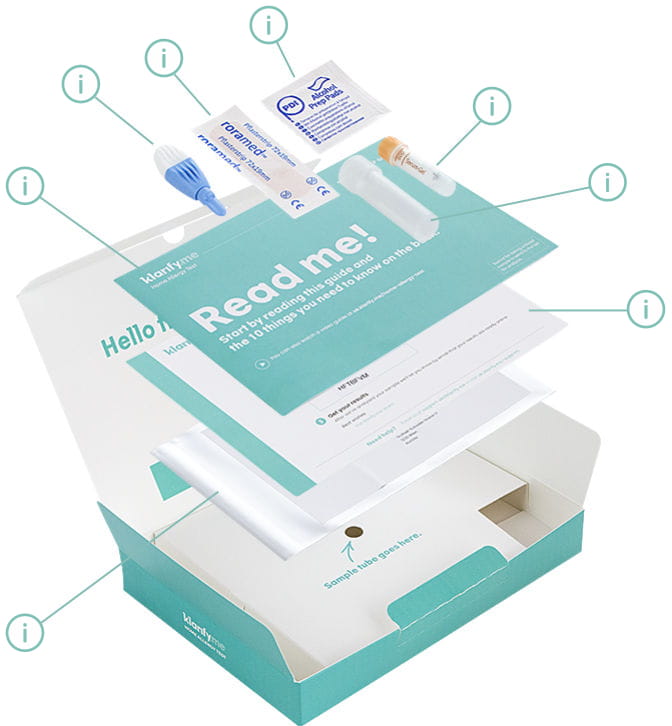Egg allergy test
Allergy to eggs is a common food allergy, especially in babies and young children. It can continue into later childhood. And occasionally adults can also develop egg allergy. It can be difficult to avoid eggs in your diet as they’re a widely used ingredient in lots of different food.
Are you experiencing certain symptoms after eating eggs and suspect it might be an allergic reaction? It can be tricky to know if your symptoms are caused by egg allergy, intolerance to eggs, or something else. How do you know if you're allergic to eggs? Well, you could start with an egg allergy test.
We've made allergy testing simple. What's more, you don't have to wait for an appointment as you can start the process of the allergy blood test at home.
Discover what your body reacts to with the Home Allergy Test. It's easy to use and backed by science. Order your Home Allergy Test today and take the first step to finding out if you have an egg allergy.
About the egg allergy test
The antibody Immunoglobulin E (IgE) plays a vital role in allergic reactions to many substances, including eggs. The Home Allergy Test is a home-to-lab blood test that can detect specific IgE antibodies in your blood and pinpoint potential triggers.
Using sophisticated technology, the Home Allergy Test analyses your body's reaction to 294 different allergen extracts and components. Allergen extracts are taken from what's called a whole allergen source. For example, an egg. Allergen components are individual proteins in the allergen source. For example, the proteins of the egg that may cause a reaction.
To start your egg allergy test you need to collect a small sample of blood from your fingertip and send it off to our partner lab for analysis. Everything you need to collect your blood sample is included in the egg allergy test kit. There's a step-by-step guide to help you and you can watch our how-to video. We also include a prepaid envelope in the test kit to send your blood sample.
You need to activate your egg allergy test online. The kit includes your unique code and instructions for this. Activating your test creates a secure, online account if you don't already have one with us. If you don't activate your egg allergy test using the unique code, we don't know who the blood sample belongs to. We can't process your test unless it's activated.
Within two weeks of posting your blood sample, we'll let you know by email that the blood test and analysis are complete and your comprehensive results are ready in your online account.
The Home Allergy Test is suitable for anyone over the age of 12 years. For children under the age of 12, a doctor needs to perform a blood allergy test. Children and adolescents between 12 and 18 must be supervised by an adult to use the Home Allergy Test.
Does the Home Allergy Test test for egg intolerance?
Allergy is not the same as intolerance. Food allergies are an overreaction of your immune system. Intolerance is when your body can’t digest certain foods.
The Home Allergy Test identifies specific food allergens that could trigger an allergic reaction. It does not test for intolerances.
Many allergens, one test
The Home Allergy Test tests and analyses your body’s reaction to 294 different allergens including:- Pollen 59
- Pets 25
- Insect stings 10
- Moulds & yeasts 13
- Foods 154
- Other 14
Symptoms of egg allergy
Symptoms for egg allergy can vary between mild, moderate and severe. An acute, severe allergic reaction is known as anaphylaxis. How severe the reaction is can be affected by certain things. For example, how much egg was eaten and how well the egg was cooked.
Egg allergy symptoms aren't only caused by eating the egg. Touching raw egg or eggshell can cause symptoms in some people. The allergic reaction nearly always happens quite quickly after eating eggs.
Common egg allergy symptoms
- Tingling or itching in the mouth
- A raised, itchy red rash (hives) – sometimes the skin can turn red and itchy without a raised rash
- Swelling of the face, mouth, throat or other parts of the body
- Difficulty swallowing
- Wheezing or shortness of breath
- Feeling dizzy and lightheaded
- Feeling sick (nausea) or vomiting
- Abdominal pain or diarrhoea
- Hay fever-like symptoms such as sneezing or itchy eyes
Anaphylaxis
In some people, a food allergy can cause an acute, severe allergic reaction called anaphylaxis. It can affect your breathing and send your body into shock. Without prompt medical attention, anaphylaxis can be life-threatening.
The symptoms of anaphylaxis can appear suddenly and quickly get worse. It can start with the symptoms listed above but can lead to:
- Swollen tongue
- Breathing difficulties
- Tight chest
- Trouble swallowing or speaking
- Feeling dizzy or fainth
- Collapse
Anaphylaxis always requires an emergency medical response. It can be very serious if not treated right away. Call 999 for an ambulance immediately if you or somebody you’re with experiences any of these symptoms.
Egg allergy or egg intolerance symptoms
If you're experiencing adverse reactions after eating eggs or food that contains egg it's key to understand the difference between food intolerance and food allergies. Food intolerance is a digestive problem. It's not an allergic reaction.
If you have an intolerance to eggs the symptoms usually occur within a couple of hours of eating them. Symptoms of intolerance may include diarrhoea, bloating, stomach pain, stomach rumbling and feeling sick. Your doctor may recommend an elimination diet if egg intolerance is suspected.
All you need is in the box
Prepaid return envelope
Use this to send your sample to the lab
Welcome card
Includes your unique activation code and instructions how to use it
Step-by-step guide
Start by reading this guide and the 10 things you need to know on the back
Lancing device
Sterile device to prick your fingertip to obtain a small blood sample
Plaster
To put on your fingertip after collecting the blood sample
Alcohol wipes
Use to sanitise your finger
Transport tube
Filled sample tube goes into the transport tube. Both tubes are then sealed into the prepaid return envelope for posting to the lab
Sample tube
Tube to collect about 6 drops of blood










Why you should get tested for egg allergy
We believe allergy testing can make a difference. The results from your egg allergy test can help determine exactly what triggers your symptoms. You can then take measures to avoid those allergens. And importantly you’ll be able to get the most suitable treatment for your specific allergies.
The Home Allergy Test can provide you with a detailed report of which allergen or allergens might be causing your symptoms. Along with details of your symptoms and medical history, your egg allergy test results can steer your doctor in preparing a suitable treatment plan for you.
Egg allergy: a closer look
You can develop an allergy to eggs at any stage of your life. Some people develop an egg allergy as a child. While others might first experience egg allergy symptoms as an adult.
Egg allergy is when your immune system overreacts to egg and food containing egg. It’s often the protein in egg whites that triggers the allergic reaction. But other egg protein in egg yolks may also cause allergic reactions in some people.
Your immune system is there to protect your body from infections from bacteria, viruses and parasites. When you have allergies, your immune system perceives a substance that would otherwise be harmless as a threat. And it sets off a chain of reactions to try to fight it off. Your immune system produces antibodies called Immunoglobulin E (IgE) specific to the allergen it’s trying to fight. In the case of egg allergy, the IgE antibodies identify the proteins in the egg whites or yolk as a threatening intruder.
In an attempt to get rid of the allergen as quickly as possible, your body produces certain chemicals, including histamine. These chemicals cause the symptoms of allergy. For example, more mucus is produced to try to flush the allergen away.
It's unlikely you'd react badly to eggs the first time you eat them. Your immune system first has to recognise and memorise the structure of the allergen before it can produce specific IgE antibodies. The process of your body becoming sensitive to an allergen is called sensitisation.
Sensitisation is the first stage of developing an allergy. It means your body has become sensitive to an allergen and produces IgE antibodies as part of your body's natural defence. Not everyone who is sensitised to an allergen will experience allergy symptoms. Sensitisation doesn't always lead to symptoms, but symptoms don't develop without sensitisation.
If you think you might be allergic to eggs, the Home Allergy Test can be your first step to find out if eggs might be causing your symptoms. Order your Home Allergy Test today.
Others say
"Very clear instructions and the packaging is high quality. Looking forward to receiving the results." - Sara P
"I got the results and I have to say, I am very impressed.
I have only ever noticed suffering from sensitivity to cats, dust and a bit on grass before moving house at the end of Feb and I’ve always been able to control these reactions with off the shelf antihistamine, the test confirmed sensitivity to all of these.
Since moving I have suffered badly from a far more severe reaction to something unknown, I had assumed it was pollen from the symptoms as I am now surrounded by trees and flowering plants and there is a park behind the house, so plenty of grass too. My hope when taking the test was to find out if this new issue was a general sensitivity or if there was something specific in my new environment which was causing it. I am delighted that the test came back with such a strong positive on Ash tree pollen along with a moderate on Olive (which as I’m reading are in some way connected) while showing no sensitivity to other tree pollen types at all.
Having checked the pollen season for Ash trees it seems to coincide really well with when I had my symptoms, I.e. through March and April I was really bad but its clearing up now in May to the point that its negligible now. Looking around outside I think I’ve spotted the culprit at the back of my garden right next to where I’ve been sitting when outside!
I was sceptical about spending the money on this but at the time my symptoms were so harsh I think I’d have tried almost anything! I’m so glad that I did this now." - Rob S.
"Great product! For a while now, I have suspected that my son might have an allergy. I was leaning towards tree or grass pollen, but he didn’t really seem to be consistently bothered when being outside. I bought the home allergy test to understand what he was sensitised to. The guide that comes with the product, made it a simple exercise to complete the test. Drawing the blood took about 20 seconds, and there is really little hassle at all.
The report came back within a couple of weeks and showed high sensitisation to house dust mite. Didn’t think of that beforehand. So now we know where to focus and we have had dialogue with our doctor for next steps and proper treatment." - Morten S.

